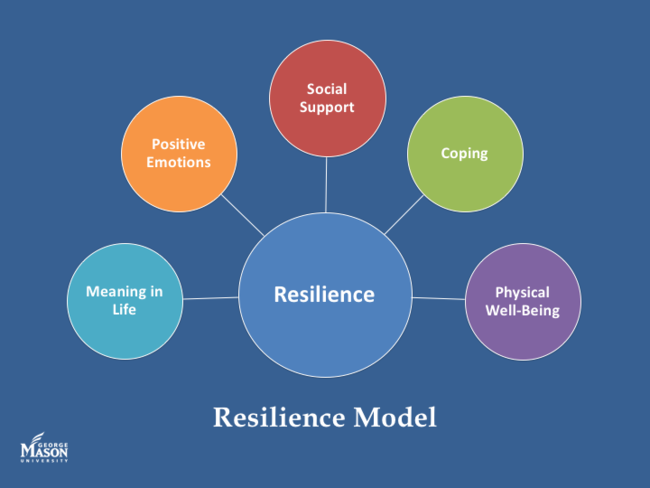by Whitney Hopler, Communications Manager
Fear can seem like a thrill in movies and TV shows. But beyond its entertainment value, fear can be a real problem in people’s lives. Letting fear control us can prevent us from achieving our full potential in life. Thankfully, fear has an antidote: resilience. The Mason Resilience Model empowers people in our university community to face their fears and not let fear debilitate them, so they can enjoy greater well-being.
Fallon Goodman, a doctoral fellow at the Center for the Advancement of Well-Being who serves as co-chair of Mason’s Resilience Working Group, knows firsthand how devastating fear can be. She recalls one night in her dorm room when her thoughts about dying spiraled into powerful fear: “I whipped off my pillow. I couldn’t catch my breath. I stumbled down my lofted bed and hurried to the bathroom. I splashed water on my face. I stared at myself in the mirror and didn’t understand who I was or where I was or why I was there or if I was alive or what being alive even meant and what this big bad world even is and … on and on and on. It was my first panic attack. I experienced true terror at the thought of my own mortality.”
It was by practicing resilience that Goodman was able to transform the negative energy of fear into a force for positive change in her life. She still thinks about dying “nearly every day” since that night. But through developing resiliency, Goodman realized that, “If I was going to die, I might as well start living. That night, I made a conscious decision that I needed to be an active agent in my own life. I needed to seek out experiences, pursue ambitious goals, and nourish my relationships. And I quickly realized that in order to live in this way, I had to tolerate pain and discomfort. Seeking out new experiences requires embracing novelty. Pursuing ambitious goals requires failure. Nourishing relationships requires vulnerability and disappointment. I think of resilience in this way – the capacity to pursue valued life aims despite the presence of stress or adversity. A person is resilient when despite the presence of setbacks, there is no substantial decline in their well-being.”
Through the Mason Resilience Model, “We provide tools to help students face their fears and not let fear debilitate them,” said Dr. Nance Lucas, our center’s Executive Director and Mason’s Chief Well-Being Officer. Those tools include positive emotions, social support, meaning in life, coping, and physical well-being.
Dr. Lucas has used those tools herself to overcome a longtime struggle with social anxiety. “Growing up, I was painfully shy,” she recalled. But her family and friends kept encouraging her to build resiliency skills, such as taking risks despite feeling afraid. “I learned to take some risks, to get out of my comfort zone,” she said. Dr. Lucas started talking to others, and now she’s grown so resilient that she can excel at the public speaking duties of a college professor. “I still have a little anxiety about getting up and talking to a group of 500 people, but usually I’m able to be confident now when I’m speaking.”
Everyone encounters fear in some way during college, but resilience can help Mason students overcome fear and learn a lot in the process, said Dr. Robyn Mehlenbeck, director of the GMU Center for Psychological Services and clinical associate professor in the psychology department. “Fears often hold people back,” she said. “One of the classic symptoms of fear is avoidance. College is a time to try new things, to grow and experience things that you have not done before. Resilience can help overcome those fears and allow you to do things you never thought you could! Resilience is also important for the times you fail – and if you try new things, eventually you will fail at something. That is all part of learning and growing!”
Dr. Mehlenbeck, who serves with Goodman as co-chair of the Resilience Working Group, said she has used many parts of the Mason Resilience Model to overcome her own fears so she can work to her fullest potential. “Expressing gratitude, obtaining social support and using coping skills have all been critical to my own growth and mentoring here at Mason.”
“Fear is a type of stress,” said Dr. Lucas, “and when people approach fear with resilience they can use their stress to accomplish something good. We’ve been socialized to think that all stress is bad. But there are ways that stress can assist you in being productive and seeking your goals.”
Goodman discovered that resilience helps turn fear into motivation. “With practice, managing anxiety in more adaptive ways than pure avoidance will allow a person to pursue meaningful goals and live life in accordance with personally meaningful values. Death scares me, but it also motivates me. It creates anxiety, and that anxiety ignites a fire in me to maximize my sliver of time on this planet.”
The model is being rolled out in several places across the University, including several University 100 classes, and with the student-led resilience working group. In addition, faculty have immediate access to nine resilience based modules (in the form of PowerPoint presentations) that provide a 30-minute intervention targeting one aspect of the resilience model. These can be accessed free at: https://wbu.gmu.edu/resilience-modules/ There are also staff willing to meet with any faculty who are interested in using these modules but have questions about them. Further dissemination projects are being developed.
Everyone can use resilience skills to tackle their fears in ways that work best for them, said Dr. Mehlenbeck. “There are many aspects of resilience. Our hope is that the Resilience Model provides a guide to increase each student’s resilience in the manner that works for them!”

